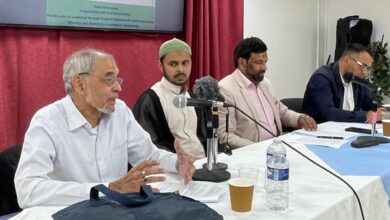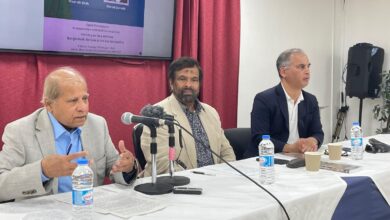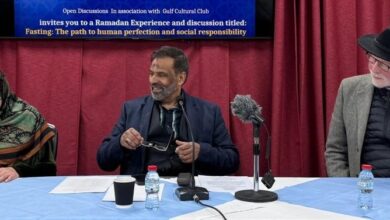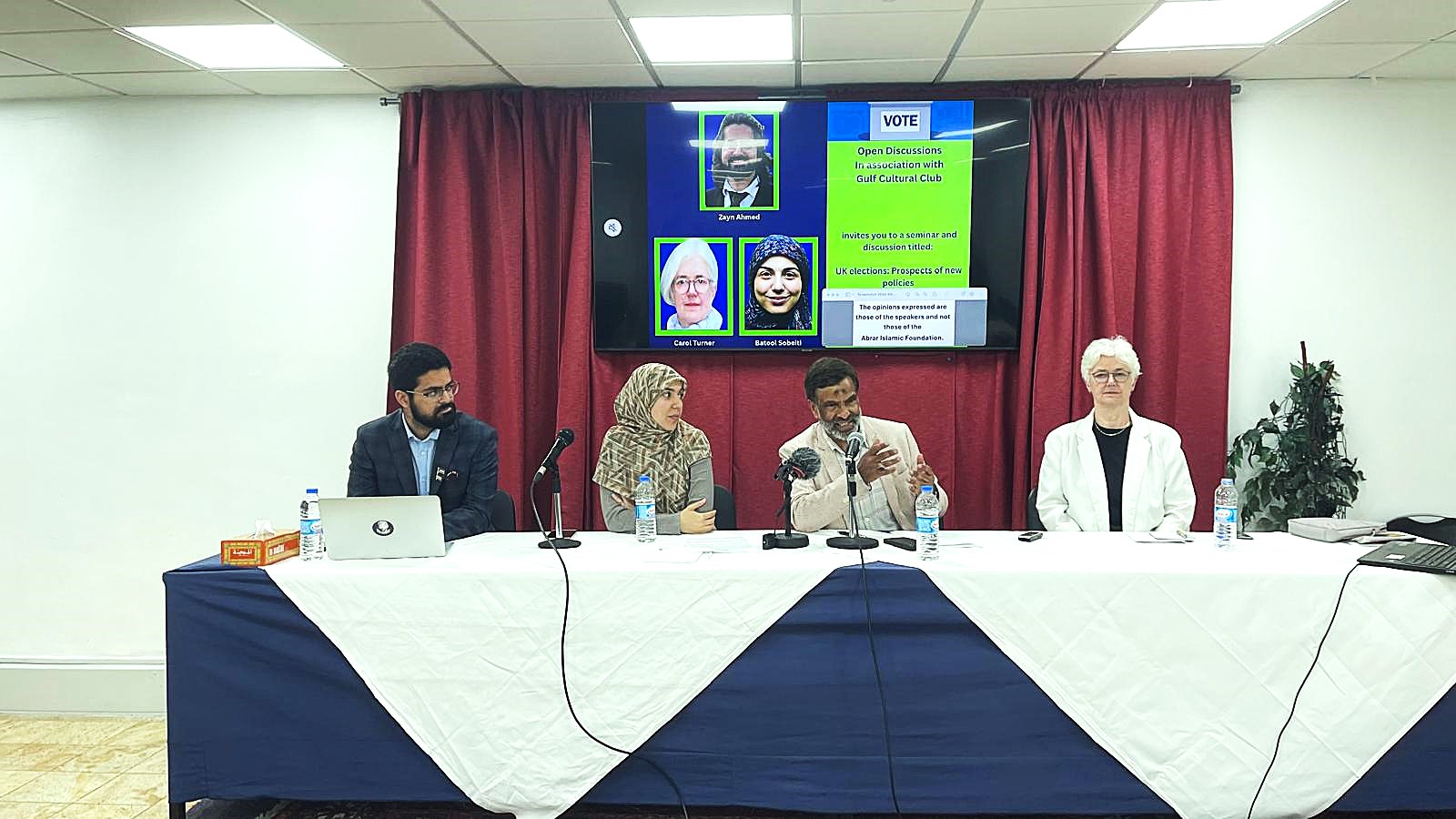
UK elections: Prospects of new policies
Immigration, Islamophobia and human rights
Open Discussions
in association with
Gulf Cultural Club
UK elections: Prospects of new policies
immigration, Islamophobia and human rights
*Carol Turner
(Vice-Chair of CND, anti-war activist)
** Zayn Ahmed
(Physician, podcast producer)
***Batool Sobeiti
(Chemical/Energy Engineer, human rights activist)
As UK citizens go to polls on 4th July, the polls suggest a decisive win by the Labour Party and a massive loss by the Conservatives. But will this lead to fundamental policy changes with regards to the main issues of concern to many? The above three areas are among many that raise concerns about the policies of successive British governments. The D-Day 80th anniversary celebrations have highlighted the British military role in World War II. It was an impressive role. Yet the international values, treaties and conventions that emerged from that most destructive war have survived the scrutiny of the politicians and how much the British public are content with what their elected leaders implement. It is also an opportunity to re-visit the UK’s position on torture by some of its allies, to mark the International Day in Support of Victims of Torture (26th June).
Batool Sobeiti: The first point we want to touch upon is understanding the Western political system we are operating in on a very macro level. When we talk about d-day and the end of WWII, the key turning point that the end of the war represented was the decisive shift of power in terms of who was at the helm of leading the global capitalist project, the shift was away from British colonialism, the hard and direct colonialism where Britain was controlling large swathes of land across Asia and Africa was disintegrating and revolutions were taking place, with America’s support, so for example in Iraq, you had King Faisal II from the Hashemite monarchy that was put in power by Britain that was overthrown and the July 14th coup in 1958 happened where Iraq transitioned into a republic and Abdul Karim Qasim was in power. Likewise in Egypt in 1952 King Farouk, again a continuation of Britian’s colonial legacy in Egypt was deposed by Gamal Abdel Nasser becoming the Republic of Egypt.
system we are operating in on a very macro level. When we talk about d-day and the end of WWII, the key turning point that the end of the war represented was the decisive shift of power in terms of who was at the helm of leading the global capitalist project, the shift was away from British colonialism, the hard and direct colonialism where Britain was controlling large swathes of land across Asia and Africa was disintegrating and revolutions were taking place, with America’s support, so for example in Iraq, you had King Faisal II from the Hashemite monarchy that was put in power by Britain that was overthrown and the July 14th coup in 1958 happened where Iraq transitioned into a republic and Abdul Karim Qasim was in power. Likewise in Egypt in 1952 King Farouk, again a continuation of Britian’s colonial legacy in Egypt was deposed by Gamal Abdel Nasser becoming the Republic of Egypt.
It wasn’t easy for Britain that was a former superpower to just give up its power like that, so there was a power struggle for the next decades that’s cut off point is acknowledged as the Suez crisis in 1956, where Britain, France and Israel invaded Egypt and America prompted their withdrawal, threatening Britain. So America here was establishing itself as the head of the global capitalist structure.
Globally we have seen direct colonisations, military occupations, invasions, or indirect hegemony through the imposition of dictatorships, colour revolutions and coups through mass propaganda, getting nations on their knees through economic warfare and sanctions. It is all designed to get the people of the nations to rebel against the government or military structures, the use of terrorism lists and proscribing. Post WWII on an international level we have seen the transnational system set up during the Bretton Woods Agreement that operates above the heads of governments in action e.g. IMF, World Bank.
It demonstrates how colonialism is as much a thing of the present as it was of the past, through corporate coup takeoffs that were to stop the ability of nations enacting sovereign policy making during the 60s, as decolonisation in continents like Africa was taking off. For example, you have the International Centre for Settlements of Investment Disputes for the World Bank, whereby multinational corporations can sue states for enacting policies they don’t like, seizing the transfer of billions of dollars from poor countries to corporations. That’s how they control them.
The principles and foundations of colonialism, in its core, are always the same: it is built on arrogance, prejudice, racism, white supremacy, hierarchy, exploitation of the colonised for the luxury and 1st world status of the coloniser.
But with the passage of time, the appearance of that colonialism changes – it is reshaped and reconfigured based on the colonial interests. We all know these examples, the transatlantic slave trade began from the 16th to the 19th century and Britain was a key part of in the tringular trade route where slave ships would leave Britain, Bristol and sail to Africa to get hold of the slaves.
The British system slavery was ended under the most important pressure – that is the shift from an agriculturally based economy to an industrial based economy. It was a question of economics, slavery became expensive to maintain. The secondary reason is the role of the abolitionists: m with greater communication people knew much more about what was happening in the colonies and agitated their governments to change.
So every phase was exposed and its ugly face was made clear, due to the mass movement of the masses and nations against it, such that it was rejected, so its forms change. Then you had the 13 Amendment end of slavery in 1865, but the system of white supremacism and racism continued. You had the Jim crow era where black people were kept from political power and working, and the system was used to maintain the segregated and dependent dominance of whites over blacks. Jim Crow never really ended in the 50s: the new Jim Crow is about using the legal system to render black people powerless and economically dependent. There was the war on drugs where black people were criminalised. The same conditions they created for the black community to resort to this behaviour was used to demonise them as well. During the 90s 1 in 3 black people had a prison record, which meant you couldn’t vote, het public housing etc. So this colonialism and slavery changed in forms but the essential outlook of that colonialism is built on has remained.
This leads to my second point. When we talk about the parties within the Western establishments, whether D & R L & C, the policies differ in how they appear. But the colonial essence hasn’t changed. Even when Britain became secondary and became a follower of America and a supporting force of American hegemony, take the war in Iraq as an example, which very interestingly had Labour in power. So you have the main primary decision taken by the world capitalist class led by America and Britain following suits, despite its different parties in power. So we all saw what happened when JC tried to come to power, he was couped from within his own party. In fact JC recently stated in an interview that during a meeting with the Parliamentary Labour Party Committee he was confronted and asked to give assurances that as Labour leader – and potentially PM, he would automatically support any military action the IOE undertakes.
So the system could never allow someone who does not tow the TCC to lead in power. You have to be someone willing to continue previous colonial policies on the same principles. The Balfour declaration of the FS of this country in 1917 that on its basis brought about the sinister lie of a “Land without a people for a people without a land,” that effectively trained the Zionists terrorists who carried out the Nakba in 1948 is the same Britain today, that handed control over IOE to America thereafter.
Including of course Europe that is effectively the tail of America and supports the IOE considered to act as the advanced military base in a region of key strategic importance that protects Western interests and disciplined the surrounding countries if they fall outside of the Western orbit. That is despite all the human rights abuses, international laws broken, Israel is nurtured with weapons, sustained financially, given immunity from penalisation in international bodies, given wide influence through its lobbying that is given the space to flourish.
If we want to talk about changes that can happen in this regard. When the nations rise and direct colonisation becomes more costly more so than the other tools or resources they can use through regional powers, such as maintaining puppets or collaborators who believe and support the Western trajectory and believe in Western values, and foresake their real and true identity and values and are inherently corrupted. When they see this method as more effective because the occupation entity is rejected by the people of the region, they will replace the direct control of this entity, but the policies remain the same: it is just the phases and faces and steps and stages that change. Direct colonisation changes to monarchy then to republics, but they are still reliant on the West on all resources and tools. There is no real independence for these countries.
They bring elites ready and prepared within western orders. We have monarchs in the Gulf that they formed and supported since WWI, they and their children and grandchildren have remained in power and there were no changes because it’s a very important region to control the world through. Despite the fact that colonisation changed from Britain to America after WW11 the monarchs of Gulf states e.g. Jordan did not change.
The third point is that the titles put forward here of immigration, islamophobia and human rights they submit to these same policies. They are details. They are tools that are in the service of specific policies that come in their own time. e.g. when do they ratchet up Islamophobia and use it and for what goals do they use it to serve the interest they have in mind.
So to not drown into the details. We need to understand this situation extends and represents the reality of imperialism and colonialism. It shows the power of capitalism in developing and regenerating itself. When there becomes a change in mood of nations, they change the form. But the policies are hostage to the West. So Islamophobia, psychological precondition to further wars, mudding people’s perceptions of the line of real resistance, create a sense of defeatism through counter terrorism laws.
Human rights becomes the cover for the cornerstone of Western policies globally that seeks to place nations on their knees through rulers, social media, policies, organisations and collaborators, imposing certain slogans that serve them before the people – they don’t care about serving the people. With immigration they want to encourage Brexit so they stoke those seeds. The seeds of sedition exist but who is stoking those seeds? Sometimes you see this phenomenon stoked up then it calms down.
These titles are used for political goals, interests and slogans are above policies. They use it to create policies. They draw policy out of slogans. They sanctify these slogans. Change their own interests when they are threatened.
The built policies on the WW11 slogans. Post WW11 freedom of speech, movement, most entity that go against it and fight it is the West. This is what was shown recently in the war on Gaza. The masks have been lifted. This genocide/atrocity, they turn a blind eye to and continue to nurture. They consider their Western strategy in the region under threat. So even if they aren’t looking for Israel to survive they want their interests to survive.
These are the results of direct colonisation. Countries don’t have real manufacturing capabilities. Self sufficiency is not there. What does that mean? If you want to fight in a war, you fight with western weapons and they won’t give you those weapons unless you are in line with their trajectory. Another example, monetary control – petrodollar. Creating the dollar as the currency in control. Swift – all monetary transactions through the dollar. This creates economic hegemony. If they ban a country from swift, it means it cannot transact trade with other countries, because swift is through the dollar. America controls the dollar, so they ban transactions even between local countries.
Carol Turner: Thank you to Saeed and the organisers for inviting me for the third time in a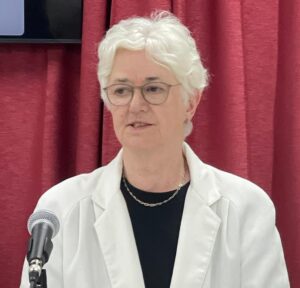 number of years. Batool in a point she made at the beginning of her introduction was absolutely correct in pointing out that Britain has gone from the dominant colonial power in the late 18th century to the 20th century to a middle ranking power.
number of years. Batool in a point she made at the beginning of her introduction was absolutely correct in pointing out that Britain has gone from the dominant colonial power in the late 18th century to the 20th century to a middle ranking power.
What it doesn’t explain is why Britain is so tied to the United States of America and its foreign and security policies which are my main interest and CND’s main interest. If you think about nuclear weapons it is frequently said by figures from Churchill onwards that the special relationship so called between the UK and the US is based on a common cultural understanding among English speaking nations. That is to find a relatively polite way of describing it a load of old cobblers.
In fact what will happen this year is that a bilateral treaty between the two countries known as the defence agreement will be ratified again by parliament without any real democratic discussion. And the basis of that treaty the nuclear weapons, and nuclear technology. To put it in a couple sentences in exchange for British intelligence and the use of British bases such as GCHQ which provide America with information that is collected from every part of the globe, Britain has access to the knowledge, materials and know how required to have trident a so-called independent nuclear weapon which is not independent at all.
And that is one of the reasons why the Labour Party and the Conservative Party have no difference between them either in this election or in other previous elections on the issue of foreign policy and security policy.
The reason that Jeremy Corbyn was ridiculed and driven out of the Labour Party is not simply because he was left wing. We have had left wing politicians and one or two relatively left wing leaders of the Labour Party in the past. It was because he was willing to break with the bipartisan policy of security. CND is non partisan. We have members from a variety of political parties and members of none who are active participants. We don’t engage in general elections or other kinds of elections by supporting parties or candidates. We call for a vote for peace. And in this election there is one exception. That is Jeremy Corbyn if he is able to be elected as an independent candidate it will be a vote for the proponents of peace in parliament itself.
I wanted to talk about the prospects for a change in policy in the forthcoming government. We are likely as everyone knows to wake up on the 5th of July to a Labour government and a I want to consider what that might mean. But I have been asked to say something about Islamophobia and I will cover that in a few minutes. These issues appear in every political party’s manifesto and there is no doubt they are more talked about in other countries than in Britain. I am not just referring to the global north. I am thinking of countries in Asia and Africa.
We are a long way from addressing these issues. We can get a flavour that won’t happen in a forthcoming government by the way in Putin talks about. I am not a supporter of Putin but I don’t think that the Russian government or the aims of the Russian leader are very substantially different than any other leader of any other country.
Despite this he is talked about in both the Labour and Conservative manifesto as if he were the devil incarnate. And I think many in the hall tonight can remember that appellation applied to Saddam Hussein, not only in 2002 but in 1991 during the Gulf war and the bombardment and destruction of Iraq.
Any opponent becomes the personification of evil and it is as clear as that. From Marx to Gandhi from socialist politicians on the left to faith leaders of all sorts many people have said and this something I agree with that in order to claim the title of a civilized society that society needs to care and look after the weak and the poor in that society. And if you apply that judgment to pretty much every country across the world you will probably agree with me that there isn’t much on offer in terms of civilisation today.
Racism is present in Britain and it takes the form of anti Jewish hatred as well as Islamophobia, it includes racism against people of colour and a lot of other things as well. Look at what happened to Diana Abbott. She made a mistake in an article a year or so ago, she immediately apologised and withdrew it. It was seen as a racist comment in an article about racism. But she was excluded from the Labour Party for over a year. It is only under the pressure of the general election that she fought her way back into the ranks of the Labour Party and stands as a candidate today. I am very glad that is the case. I think Diane Abbott is an incredible inspiration not just to people in Britain but across the world and believe me she is internationally very well known.
It gave me, I am a member of the Labour Party for my sins. I probably should not say this in a meeting that is being recorded. It gave me a great deal of pleasure seeing a lot of Labour Party people with their fingers crossed behind their backs saying how delighted they were to welcome her back to the party.
It is not just Labour of course. You can take the example of Sayeeda Warsi in the Conservative Party. She was the chair of the Conservative Party for a while and for five years or more she had been campaigning and was openly outspoken about the Islamophobia that exists in the Conservative Party.
More recently Islamophobia has taken a particular twist. That is because of Israel’s war on Gaza. It took a huge movement, hundreds of thousands, millions of people on the streets not just in London but in towns and cities across Britain to put sufficient pressure on the Labour party to change its position and for the Conservative Party to make verbal accommodation.
What if any difference that will make if Labour comes to power remains to be seen. But one of the reasons for that in my opinion is the strength of the Israel lobby. And by that I mean the organized lobby or organizations and individuals who lobby the British government and other arms of the British state to support the policies and actions of the Israeli government.
They are just as powerful as they are in America. I think the main difference is is that it is more convert and less known and talked about in Britain. But one of the things they have managed to do is to create a division between anti Zionism and anti Semitism. There isn’t time to go into what that means. I have very many Jewish friends who attend the Gaza demonstrations who will point out that it is not anti Semitic to oppose the policies of Israel particularly those of the last eight months.
One of the effects of that is to downplay the impact of Islamophobia. There is an organization in the Labour Party called Muslims for Labour. It does what it says on the tin and they have been a very strong voice within the Labour Party calling on the leadership to take more firm action on this issue. There is Islamophobia in the Labour Party as there is in the Conservative Party and across all the political parties.
One of the things that Muslims for Britain highlighted is that since the EU referendum in 2016 there has been an incredible rise in hate crime both violent and non violent against Muslims. The Home Office figures for October 2020 showed the highest number of recorded hate crimes in the UK were against Muslims. Of almost 7000 religious hate crimes that were reported to the police over 50 percent targeted Muslims. This is not to downplay other forms of racism or suggest that you can only address racism with statistics. But it is something that in my opinion none of the political parties seriously address.
I want to return to the main thing I wanted to say which is about immigration but primarily what is going to happen when we wake up on 5th July and find in all likelihood that there is a Labour government in power.
I don’t agree with the point that Bathool made that it will not make a difference, they are all the same. I think if you want to change society you have to start from where you are and work out how you get to where you want to be. And being politically active means by definition in most countries and certainly in Britain, that you are making concessions.
I just want to make a few points and see if we can draw out some of the likely consequences of the election. One of the first things you notice is not simply how similar Conservative and Labour policies are on all the big issues but how professional the Labour Party is compared to the Conservative Party.
I almost felt sorry for Rishi Sunak launching the election with no umbrella, going to Ireland where the titanic was built and standing under an exit sign to give an interview – and there is a whole series of other slips ups people have registered.
I don’t think that reflects necessarily on him but it reflects on a very poor team that surrounds him. What it is a measure of is the degree of difference within the base of the Conservative Party and you can pick this up in the next couple of weeks when Nigel Farage stood in the election.
One of the things that is talked about is immigration. Not immigration as whole – how we have a system of checking people in, helping them to find a job. No elements of positive policy but simply shipping undocumented arrivals back to somewhere like Rwanda which of course we all know is a very safe country to send people to.
And one of the functions of Farage and the reform party is not simply to put pressure on the Conservative base which he is undoubtedly doing. He will also in my opinion attract some votes from sections of the Labour Party which people refer to as the red wall. It is actually a lot more sinister. It is to shift the debate to the right when it comes to immigration.
If Starmer forms the government it will be a conventional, cautious government. That means that Labour to and the whole discussion, the whole of the British establishment will be shifted to the right. We can see this happening across Europe.
I think one of the main lessons we should take from the election campaign is the need to keep campaigning in support of refugees, calling for a supportive immigration policy, calling for a security policy which argues for peace and not militarising British society in the way that is happening.
And I hope that all of you no doubt with the reservations about a Labour government will feel that it is still worthwhile engaging in political activity and campaigning activity. If you agree with that point I hope you will support some of the things CND will be doing.
Zayn Ahmed: I hope to touch on a few different areas today briefly, with a focus especially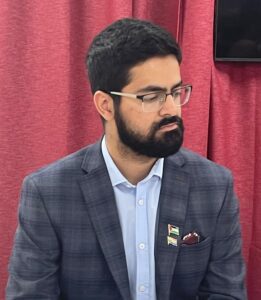 during the later Q+A on the student and youth voice in the upcoming elections and on Palestine.
during the later Q+A on the student and youth voice in the upcoming elections and on Palestine.
In this initial section I aim to tackle the question of what to expect with a Labour victory by speaking about multiple areas: Starmer as the new PM, the sinister bills that he will ensure are pushed through, the effects of lobbying across both parties, and how the ruling class is all one big club.
To start with, I think it’s important to address the key topic of today’s discussion, very pertinent for the current affairs of this country, and that’s the upcoming election, specifically what it means to have a Labour Party win, as well as what change that might bring. As has been mentioned, it’s widely agreed that Labour is likely to win this next election, with many polls pointing to a resounding landslide victory and with Keir Starmer as our next Prime Minister.
This should be a cause for concern for us as citizens. We’ve already seen his vacuous and robotic “personality”, if you can call it that, in multiple interviews and articles. I imagine everyone here has seen snippets of his interviews wherein he’s asked basic questions and he fails to answer other than from his script, from which he doesn’t deviate. As one example, have a listen to his interview given after he was asked about Natalie Elphicke defecting and crossing the floor to the Labour Party, and as another, have a read of the interview with the Guardian recently published where he fails to be able to even provide answers to frivolous questions. Even more dangerously however, we’ve seen evidence of him being disingenuous and lying, with his ten pledges being dropped, how he acted as a friend of Corbyn until unsuitable, how he used to support the Palestinian cause until inconvenient for him…
This is a man who couldn’t even bring himself to say if the country would be in a better place if Corbyn had become prime minister. General voters generally agree they do not know what he stands for, that he has no personality, and that he has no policies of note – is this not something we should be worried about?
As George Galloway recently put it, he’s “Blair without any of the redeeming features”. But if we look further in depth at his record so far, we can see that he truly is hiding behind a facade of superficial “change” while facilitating the passage of quite sinister bills and laws, going as far as taking action against those MPs who refuse to fall in line. I’ll list some examples but for the sake of time I won’t go into them in too much detail; I encourage you all to look them up if you haven’t heard of them.
Covert Human Intelligence Sources Bill, legislation that allows undercover officers to break the law without fear of any legal accountability. Only 19 Labour MPs rebelled against Keir Starmer’s order to abstain from voting once again, including Jeremy Corbyn. The vague and unclear legal parameters in this MI5 Bill allow murder, torture, and sexual assault to be carried out by undercover officers with the excuse of keeping their “cover”. The government didn’t even want to grant token reassurances that human rights will be protected, instead allowing each operation to be assessed at the time. This authoritarian bill allows them to get away with whatever they like without even fear of being caught.
Overseas Operations Bill legislation introduces a presumption against prosecution for British soldiers serving abroad, applying to offences such as war crimes and torture, and critics say it breaches international humanitarian law. To put it simply, this effectively decriminalises torture by British soldiers. Unsurprisingly, the Bill passed. Keir Starmer ordered his MPs to abstain on the bill, allowing it to go through relatively unopposed. 18 Labour MPs broke the whip and voted against, mostly members of the Socialist Campaign Group, including Jeremy Corbyn. Three of the rebel MPs were junior shadow ministers, and were sacked for voting against the Bill, and for following their consciences.
The Police, Crime, Sentencing and Courts (PCSC) Bill, heavily criticised for its strict measures against freedom of expression and protest. The provisions in the bill aim to suppress protests in their effectiveness, with serious threats against this form of expressing dissatisfaction in a supposedly democratic society.
Furthermore, the connections of the Israeli Zionist lobby in all levels of the UK Parliament have been spoken about a lot in recent months, from the Friends of Israel lobby groups to the funded trips abroad and secret meetings held with MPs.
Look at the Al Jazeera documentary The Lobby for those who haven’t already seen their incredible findings. Look at the Labour Files, speak with innocent people who were hounded out of the party and smeared, listen to the harassment and systematic targeting they faced, the betrayals and backstabbing, the way their complaints were ignored, the way that people were dismissed. And the reason for all of this is to stop people from stretching the bounds of acceptable thought.
As described by Noam Chomsky, the way the world works is to vastly narrow the scope of acceptable debate, but encourage very lively discussions within that. This is the idea of creating an illusion of free thought and democracy – we can see this in the way society sets us up for an illusion of choice. As George Carlin put it, look at how we have just a handful of media conglomerates that own and control everything (film studios, newspapers, radio, TV stations, etc etc), we have a handful of banks, a handful of oil companies, two major political parties that advocate for largely the same thing, and yet if you want ice cream you can choose from 31 different flavours.
He was definitely right when he said that you don’t need a formal conspiracy when interests align. In fact, let’s speak more about that very briefly – it’s all one big club. I’ll give an example case study of this, using one of the big new stories that came out in 2021, and that’s regarding Allegra Stratton, the scalp that was offered up for the government breaking their own laws on Covid, partying while the country suffered. Allegra Stratton if you remember was the government’s Press Secretary who resigned from her post after footage emerged from the previous year joking about a Christmas Party at Downing Street. The reason this was such a big scandal was because at the time the country was under a strict lockdown, with roughly 500 deaths a day at the time, families were separated, people couldn’t visit loved ones, etc etc.
Despite that, the government broke their own rules (some allegations even said there was a party in Boris Johnson’s own flat), and invited were high ranking members of the government and media, including from the Daily Mail and the Telegraph. The reason I mention this specifically is because it’s not only that the Labour and Tory parties are the same, but those who control our media consumption and the narrative we are fed are more than complicit!
Just look at how Jeremy Corbyn faced an onslaught across the media, from edited photographs, to videos comparing him to an evil fictional character played on national television, to footage of his opponent laying a wreath replaced in his favour, to fake news being spread by widely respected “neutral” political commentators of his supporters being violent, as well as the repetition of talking points.
And that’s a key point there – by consistently framing the debate in a certain way, the parameters are set and predetermined for us: if you repeat a lie often enough, it becomes the truth. If your questioning takes as an assumption that something is true, you are instilling the idea into the collective subconscious of the populace: in this case, if your questioning of the debate is “how to deal with the antisemitism problem in this party”, there is a carried assumption that the problem exists as you’ve defined it, and that the only acceptable debate here is on exactly how it should be vociferously countered. And this is exactly what even “progressive” journalists and media outlets bought into, sometimes telling themselves that this was the way to win people over, and perhaps sometimes even with more sinister intentions…
Sorry for the digression, but let’s return to the case study on Allegra Stratton and this all being one club. She attended public school, went on to Cambridge university, and got her job in the media. A common pipeline we see our media and government class move through in their careers. She worked at the BBC and The Times, and wrote for The Independent and the New Statesman. She then joined what is supposedly a “left-wing” media outlet, The Guardian, then returned to the BBC, where she was heavily criticised for an interview that publicly “humiliated” a single mother claiming benefits. She joined ITV news, working with Robert Peston, who also writes for The Spectator and is a former BBC economics editor. She then became Director of Strategic Communications at the Treasury under who? Rishi Sunak.
Not only that, Sunak was best man at her wedding and these couples are godparents to each others’ children. How intertwined is this? The media class and the ruling class are as closely linked as they could be! But who is this husband of Stratton? Let me introduce to you James Forsyth, political editor of the Spectator and weekly columnist for The Times, and former writer for the Sun and The Mail on Sunday (you know, those newspapers that we’ve already mentioned that the others worked at).
The commissioning director of The Spectator was Mary Wakefield, married to none other than former special advisor to Boris Johnson, Dominic Cummings. In fact, let’s pause on Johnson for a moment, and remember that he himself is a former editor of the Spectator, where he wrote disgusting Islamophobic pieces in the past including writing that Islam and the Quran are backwards, and how its chairman, Andrew Neil, is a former political presenter at the BBC and former chair of GB News. The Spectator is owned by the Barclay brothers who also own the Telegraph, which also employed Johnson in the past.
Now when all these people jump around from publication to publication, from media to government and back again, from supposedly “left wing” to “neutral” to “right wing” outfits, similarly to how politicians regularly cross from Tory to Labour etc, do they ever change their politics and beliefs in these jumps? Or are they all instead dressed up differently, to give the illusion of a free press? People seem to think the media is being controlled means reporters are being given a sheet of paper that they have to read off signed by “the government”. Please refer back to the words of George Carlin I quoted earlier.
And this is all just the very surface level, this is the stuff it doesn’t actually take much digging to find. This is just what’s meant to be accepted as normal and “how things work”, and we aren’t supposed to question the system. But to go one step further, Mary Wakefield’s father is a co-director of Admiral Associates, where £670,000 of UK taxpayer money was spent to hire PR consultants for Kate Bingham, head of the vaccine taskforce. By the way, that’s Kate Bingham, wife of Financial Secretary to the Treasury, MP Jesse Norman. But don’t worry, that’s not relevant…
Do you ever wonder why this country’s political discourse and accountability is so poor? Politicians and journalists attend the same schools and universities, get cosy with each other’s families, give each other money and jobs, and so much more…
In any other country this is decried as cronyism and corruption, and how these backward third world countries operate, with briefcases full of cash and one family ruling for decades. In this country, what do we call it?
And on top of all of this , what I always tell people is question not just the content and information you receive, but why you receive it, and, sometimes just as importantly, when you receive it. Remember, the story on Partygate broke in 2021 using evidence from the previous year. Is it any coincidence that when this story emerged, it was just as the Nationality and Borders Bill was being passed, with the citizenship of many minorities in this country being put at risk? And so while Starmer used this opportunity to criticise the government for the Christmas party and give the illusion of an opposition effectively holding a government to account, what was he allowing to pass through Parliament in the background? Scalps have to be offered now and again, but don’t let that fool you into thinking you now have a transparent and fair system.It’s all one big club, and you’re not part of it.
Do we truly have a complete democracy when MPs cannot truly represent the views of their constituents? And when we convince ourselves that this is the way to make change? What is the benefit of patiently waiting until the critical moment, only to not act when that moment arises? Is this why we elect token Muslim MPs?
A question that should often be asked is what is the benefit in decimating the tories if you give a landslide victory to the same people in different coloured ties? If someone has been speaking in Islamophobic and racist dog whistles, if they’ve been attacking migrants and the working class for everything that goes wrong in this country, if they’ve consistently voted for more wars and less funding to public services, and they then remove their blue rosette and pin on a red one, why is that something to celebrate?
If you “win” the election by replicating the policies and approach of the other major party, what kind of victory is that, other than pyrrhic? The real victor is not then the people, but those at the top. We are constantly told to “grow up” as this is how you win, but what is the benefit of winning, unless your end goal is power? Why are you treating a political party like a football team? Is it any surprise at all that when Margaret Thatcher was asked her greatest achievement, she said “Tony Blair and New Labour”. This is what shifting the Overton window looks like. At some point we must contend with the fact that constantly voting for the lesser of two evils is still voting for evil. Why should we be willing to compromise and sacrifice our morals, ethics, and principles for what may be perceived as one good thing? And remember, a landslide win is not good in any democracy.
To conclude my talk, I’d like to address an interesting part of the brief of this event today, and that is the idea of international law post WW2. As was mentioned, the 80th anniversary of D-day was recently commemorated, and especially with events in the last few months, international law has been discussed extensively. What I hope we are able to do with these sorts of events is re-examine the narratives that have been so deeply drilled into us that we do not even think to question them. What we have ingrained in our minds from school days for instance is the idea that Britain fought the Nazis because they were the epitome of evil. Is that an accurate telling of the story though? Is it really accurate, for instance, to make comparisons from history that conclude along the lines of “how can we let this happen now, when we bravely fought evil in the past”?
Perhaps we need to re-evaluate that history we were taught – was the issue with the Nazis that they were evil and morally corrupt people who harmed innocent people, or was the issue that the Nazis operated in a way that was threatening to Britain and its allies? This is perhaps a conversation that requires a separate discussion in itself, but I find it fascinating that there are certain ways of framing history that set us up to never even think of questioning them. Is it well-known, for instance, that in Athens in 1944, while Britain was still at war with Germany Churchill ordered the British Army to fire upon a demonstration of civilians who fought against the Nazis? Or that the British Army handed out guns at this time to Nazi collaborators?
Is it well-known, for instance, that there was a secret US intelligence programme called Operation Paperclip in the 1940s to mass-recruit Nazis? This included over 1,600 people. In fact, if we look into the new world order post-WW2, we can easily break down the myth that the Western world was de-Nazified. I will briefly give a handful of examples:
– Wernher von Braun, a German aerospace engineer and leading figure in Nazi rocket technology, who developed the V2 missile used so frequently against Britain and its allies. He joined the SS, was promoted multiple times by Himmler, met Hitler multiple times, wore the SS uniform to meetings, and approved slave labour and torture. He, along with his team, was recruited by the US and became a director at NASA.
– Adolf Heusinger was the Army Operations Chief for the Nazis, helped plan the invasions of various European nations, and became the Chief of General Staff, one of the highest posts there was. He then became a top adviser in the West German military. He then went on to become Chairman of the NATO Military Committee.
– Kurt Waldheim, a squad leader in the SA who received honours for his part in war crimes against the Yugoslav resistance. He held multiple diplomatic positions in Austria after the war, and became the Secretary-General of the UN for two terms, his work overseen by Henry Kissinger. Not only that, he then became President of Austria.
There are so many more example of this that could be found online if you search for it, but what they do is paint the picture that the international bodies and laws that were set up in the wake of WW2 were largely as a vehicle for Western foreign policy interests. This is evident purely from how law can be recognised when it suits Western nations and yet ignored when it doesn’t, case in point being Nicaragua vs the US in 1986 (for those who do not know,…).
The main reason I mention these points is so that we can accurately contextualise the conversation we are having. When we bring it back to these upcoming elections, we are not voting in a vacuum for change, we are facing a system that is carefully designed and crafted to work against us, not as a vehicle waiting for us to step in and make a change. The system is not broken, it is working as intended – a reminder to us all that a system cannot fail those it was never designed to protect.
*Carol Turner is co-chair of London Region CND and a Vice Chair of CND UK. She is a member of Stop the War Coalition’s National Officer Group. Carol is a long-time peace campaigner, a former foreign policy advisor to British parliamentarians, and author of Corbyn and Trident: Labour’s Continuing Controversy.
**Zayn Ahmed is a doctor currently completing his second foundation year. He studied medicine at Barts School of Medicine where he served as president of the Ahlulbayt Islamic society. He served as the Chair of the Muslim Student Council or MSC, the umbrella body for Ahlulbayt societies in the UK. He produced Al Haadi youth podcasts where he hosted a number of interviews with local politicians. He has delivered workshops at multiple Muslim centres looking into Palestine and the history of occupation over the past few months.
***Batool Subeiti is a Lebanese-born Energy Engineer and political analyst activist based in the UK. She is Chemical/Energy Engineer by profession. She obtained her MEng Degree from the University of Birmingham. She is a regular article writer and contributor to outlets like Al-Mayadeen and Press TV. She has a special interest in analysing political and social issues, seeking to understand them from their root causes and from an angle otherwise not projected by mainstream media.

